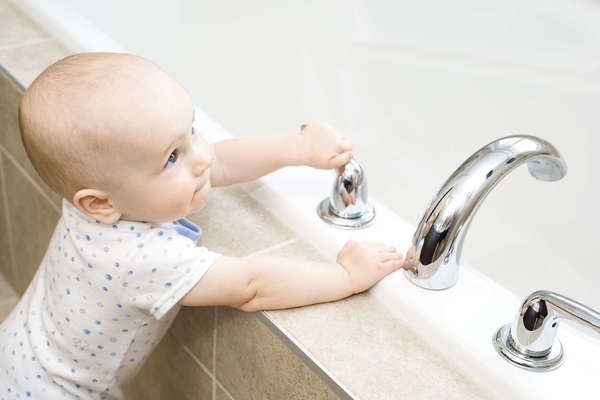
21 ways to baby-proof your home!
12 Feb 2014 | 5 min Read
Baby Chakra
Author | 501 Articles
While parents constantly worry about kids being abducted, or subjected to violence, they miss the fact that they are in danger in their own homes. Here are some baby proofing advice you must implement.
Constant supervision is important, but realistically, that is not always possible. It takes just a second for an accident to happen. So what parents should do is baby-proof their houses as far as possible, so that accidents are minimized.
To baby-proof a home, get down on the floor, to the baby’s height, and look at everything from the child’s perspective. Children are very curious and adventurous, and they have no sense of danger. So it is important to think from their point of view – what looks attractive around the house? What would tempt you to play with it, or put in your mouth?
Here are some tips for you to get started!
1. Safety gates:
Install safety gates at the top and bottom of staircases, at the doors of unsafe rooms like the kitchen, bathroom, balcony, or the main door. And don’t forget to keep these doors closed after you go through them!
2. Sharp edges of furniture:
As far as possible, avoid furniture with sharp edges. Or else, put rubber guards or bumpers on their corners so that even if the child hits her head, the injury is minimized.
3. Tiles and carpets:
See that the flooring and tiles are not too slippery! Carpets, rugs and bathmats shouldn’t have edges that are lifting up, on which a child could trip and fall.
4. Sharp objects:
Keep knives, scissors, and other sharp objects out of reach of children.
5. Toxic substances:
Ensure that cleaning products, and medicines are placed in higher shelves, which children cannot reach.
6. Drawers:
Children absolutely LOVE to open to drawers. The problem is that the drawer and its contents could fall on them and injure them seriously. Rework drawers so that they cannot open fully, or put childproof locks on them. But do have a couple of safe designated drawers for the child to satisfy its urge to open drawers!
7. Tall furniture:
Furniture which is greater in height than in breadth have a propensity to topple. Consider removing such furniture, or fastening them to walls. Drawers on these are especially dangerous, as opening a drawer too fast might make the whole piece of furniture fall on the child.
8. Windows:
Ensure that windows are barred, or install safety latches that cannot be opened easily. Also, don’t place any furniture which the child can climb on top of, near the windows.
9. Balconies:
Balconies can be very dangerous. It is a good idea to enclose the balconies, or install wire meshes so that a child cannot accidentally fall out.
10. Choking hazards:
Remove any object that can be popped into a child’s mouth – marbles, pebbles, small toys. This is especially pertinent if you have an older child who has toys with small parts. If possible, educate your older child too!
11. Doors:
Banging doors can seriously injure a child. Install door stoppers, or magnetic door holders that hold the door in place even on windy days.
12. Locks:
Disable automatic locking of the main door, so that the child doesn’t lock itself in alone. Some bedroom and bathroom doors also have locks, and it is a good idea to disable these too, just in case the child gets locked into these rooms by mistake.
13. Toys:
Before you buy toys, check that it is of good make. Some toys have sharp edges or toxic paint.
14. Crystal:
Keep all crystal, porcelain and china on higher shelves. If the child breaks any, it could hurt itself with the broken shards.
15. Stove and Gas cylinders:
Ensure that the child cannot reach the stove. And see that gas cylinders and their pipes are out of the child’s reach.
16. Water:
Children are top-heavy, and they can fall face down into water while peering into a bucket of water. Never leave water lying around, and don’t leave the child unattended in a tub.
17. Fire alarms and sensors:
Consider installing fire alarms and gas-leak sensors at home. Have a fire extinguisher handy.
18. Electrical outlets:
Use electrical tape or outlet covers to seal electric plug points – Children are very attracted to these, and love putting their little fingers into these holes.
19. Wires and cords:
Keep long wires and cords wound up and out of reach of children. They are a strangling hazard.
20. Plastic bags:
Don’t keep plastic bags lying around. If children put them over their heads, they could suffocate.
21. Plants:
Keep houseplants away from children – some leaves and fruits might be toxic.
Apart from all this, ensure that if you are staying at somebody’s house for a long period, their house is baby proofed too. Or else, you have to be constantly on the alert. Also remember that childproofing is an ongoing process. Childproofing that works when the child is 1, might not work when the child is 2!
Also, do keep a first aid kit and the doctor’s number handy, in case of accidents.
Always better to be safe than sorry when it comes to baby-proofing the home – but remember, don’t get paranoid!
Need help in Baby proofing your house? Get in touch with Safe Baby.
A


Related Topics for you
Suggestions offered by doctors on BabyChakra are of advisory nature i.e., for educational and informational purposes only. Content posted on, created for, or compiled by BabyChakra is not intended or designed to replace your doctor's independent judgment about any symptom, condition, or the appropriateness or risks of a procedure or treatment for a given person.
